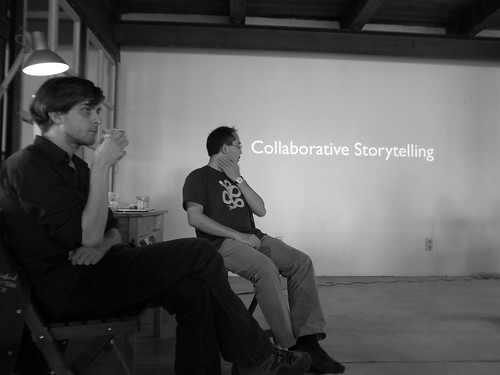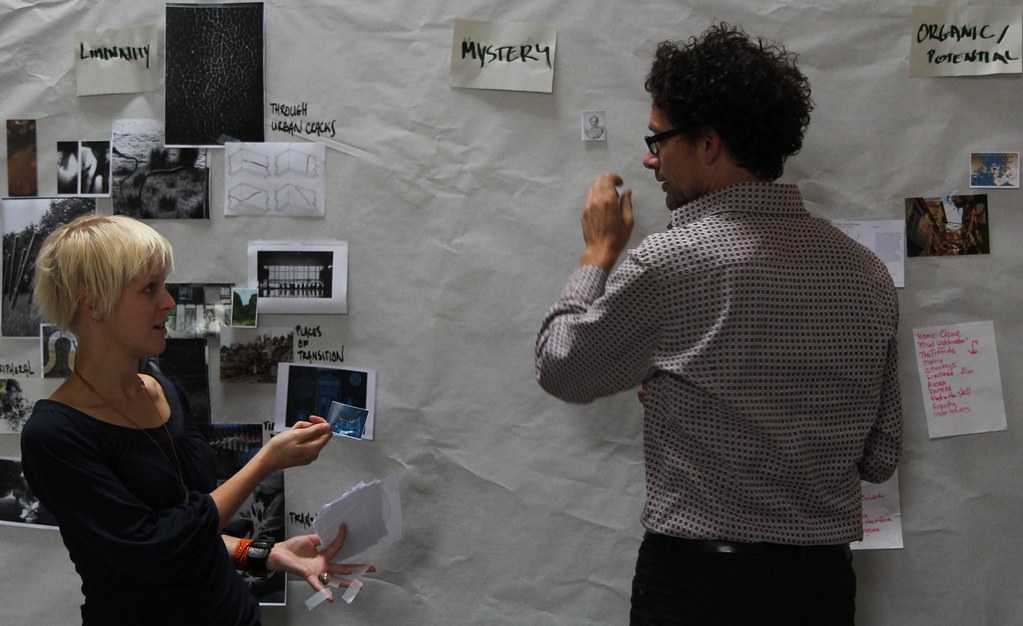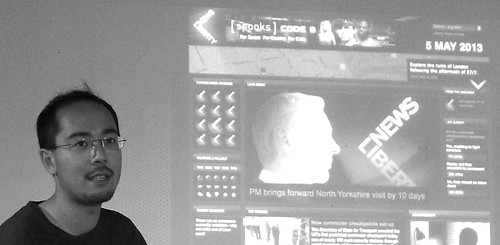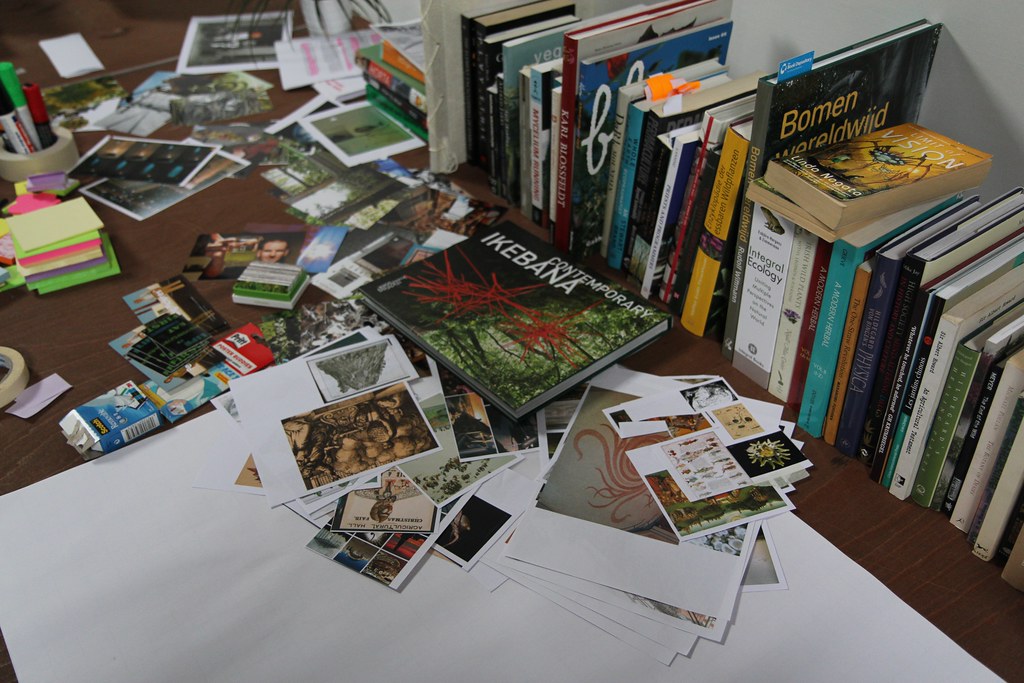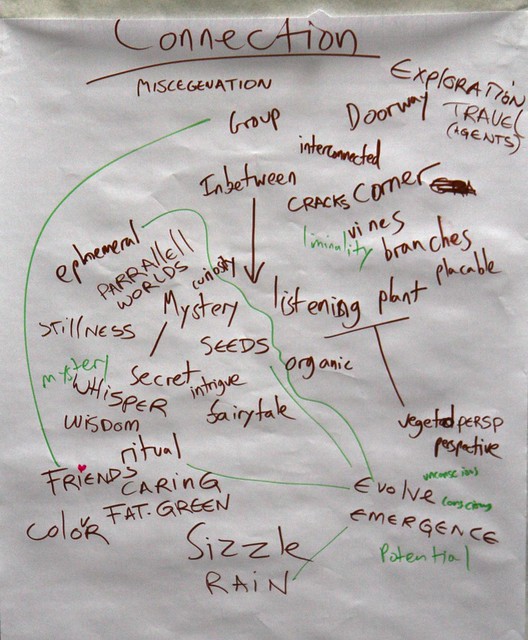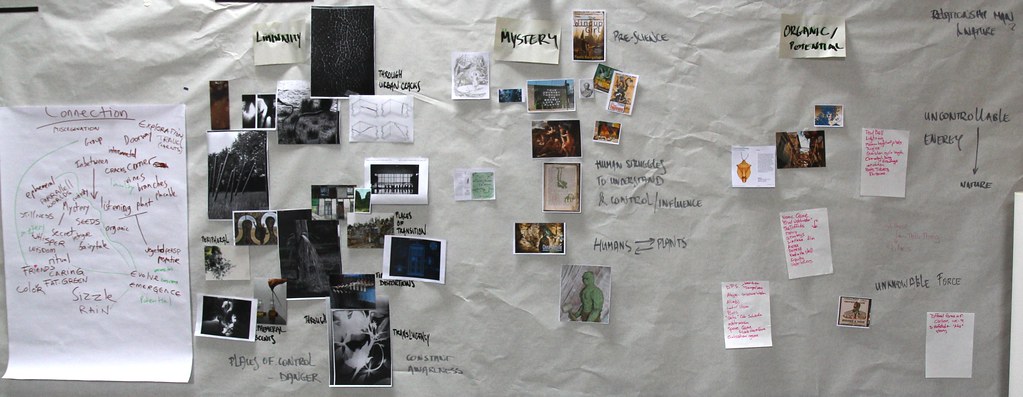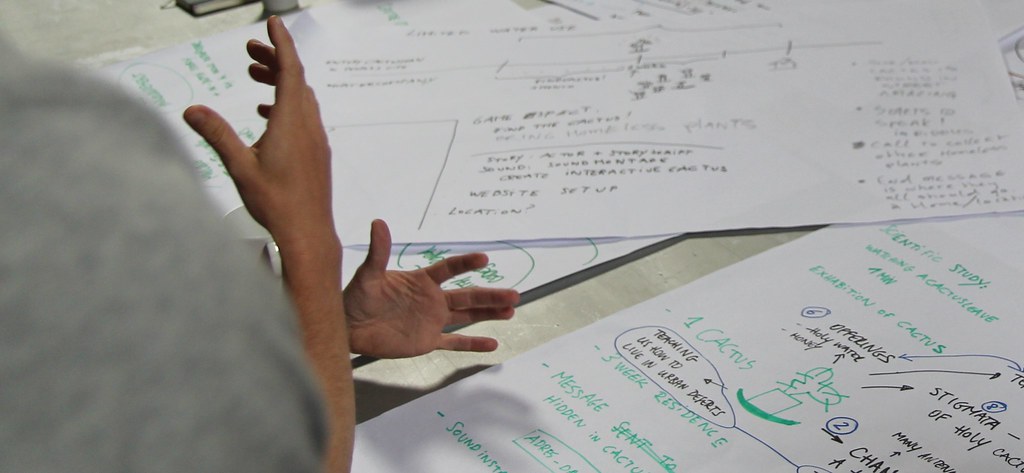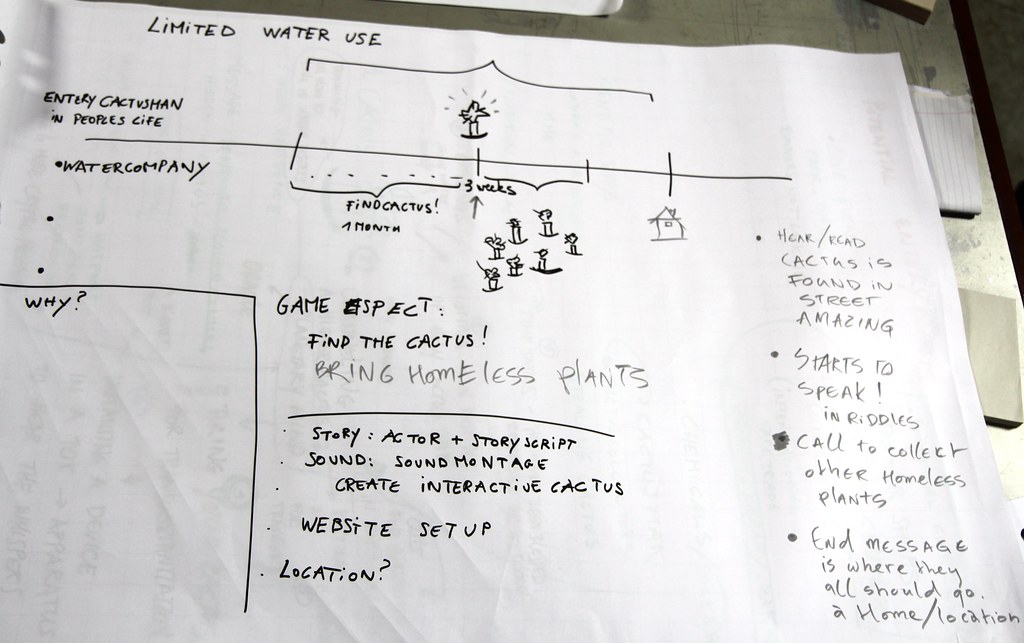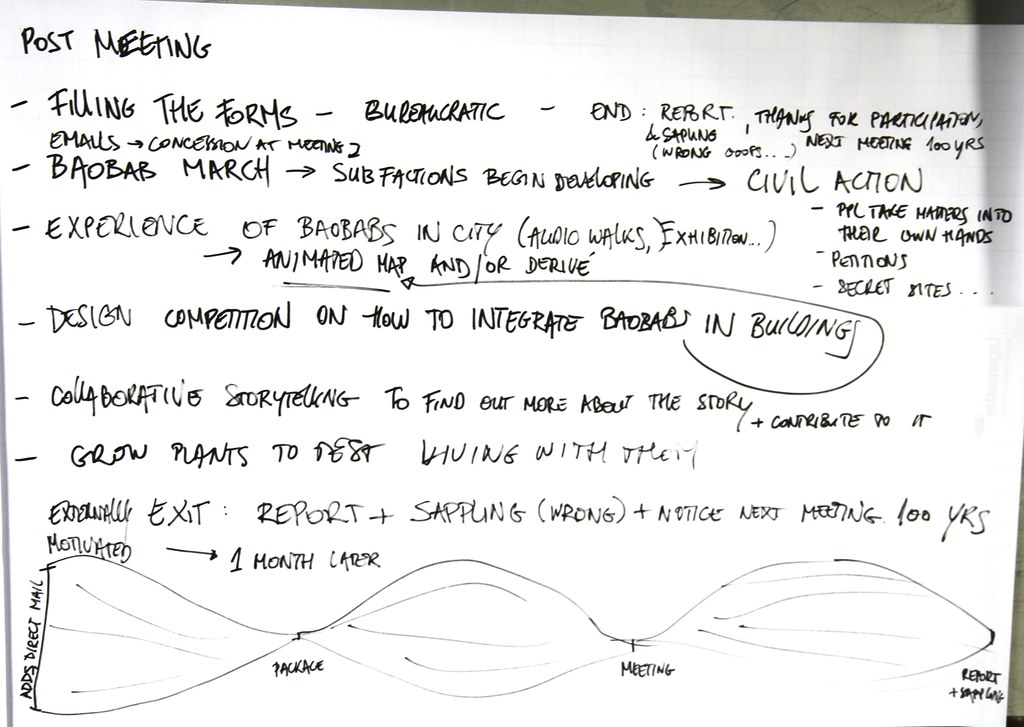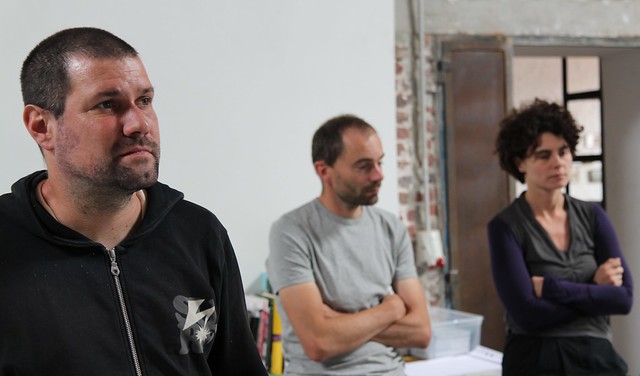Table of Contents
ARG Tutorial
Lead by Adrian Hon and Matt Wieteska hosted at FoAM Oct 2011 http://fo.am/arg_tutorial/
Photos: http://www.flickr.com/photos/foam/sets/72157628840577629/with/6685434737/
Slides (23Mb): slides-six-to-start.pdf
Participants: Rebecca Lanaerts, Frank Bergsma, Pippa Buchanan, Tim Boykett, Theun Karelse, Goran Kuzmanovic, Bart Vandeput, Christina Stadlbauer, Nik Gaffney, Maja Kuzmanovic.
Introduction by Maja Kuzmanovic
Welcome to the first in the series of PARN tutorials. PARN1) investigates 2 strategies of storytelling in physical spaces. The first one is the physical narrative, a situation in which fragments of the story can be discovered in the space itself - through objects, media, clues hidden in furniture, phone messages, etc. Alternate reality narrative is a story that unfolds in the spaces of everyday life, and keeps evolving through participation and collaborative storytelling.
FoAM's contribution to PARN is an ARN about human-plant interaction. This is a topic that FoAM has been exploring for over 10 years in the groWorld initiative (http://fo.am/groworld). Over the years, we realised that there is a disconnect between communities interested in plants, such as elderly gardeners and young gamers for example. At the same time, all the different plant enthusiasts tell stories - from foraging adventures, to gardening blogs, no matter what their relationship with plants, they all have stories to tell about them. Furthermore, our cultures are full of myths and fairy tales about plants and yet in the last decennia plants were neglected in the mainstream culture. This is slowly beginning to change, and at FoAM we'd like to capture this momentum to connect the different plant stories together. AN ARN/ARG seems to be a promising format.
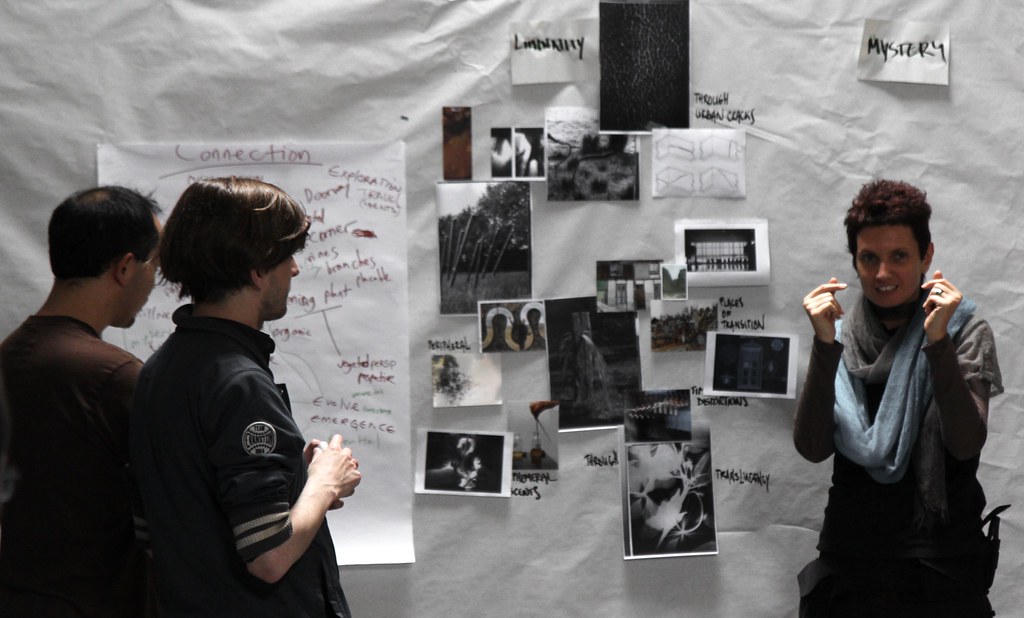
For FoAM stories are just a beginning - they are a way to test a possible future in a safe, playful setting. Our challenge is to engage people and plants long after the ARN/ARG finishes. Our aim is to stimulate development of a vegetal culture that sees plants as organisational principles for human society in this century - following clockworks, steam machines and computers. A vegetal society has rich, introspective qualities, is able to purify and enrich its environment and is aware of its entanglement with every animate and inanimate being on its path. Before a vegetal society can take root, we'd like to capture people's imagination with stories of an alternate reality, set in an atemporal world in which plants and humans cultivate each other. As Fukuoka said in One Straw Revolution: “The ultimate goal of farming is not growing of crops, but cultivation and perfection of human beings.”
For FoAM, and ARN is a form of divination - a summoning of a possible future to become reality. There are glimpses of this reality scattered across FoAM's studio & we hope that some of it will seep into our exercises in this tutorial. As with any divination, I'd like to invoke a guide, Viriditas, a greening force behind all life, to help us draw stories from our vegetal mind. I'll play a piece of music composed by Hildegard of Bingen, in honour of Viriditas. It is performed by Synfonie, an ensemble directed by Stevie Wishart, who might be the composer of the Borrowed Scenery ARN. WHile the music is playing, take a few minutes to arrive & breathe & think of a personal encounter with plants - it could be anything from eating spinach to communing with a christmas tree…
Introduction to Six to Start by Adrian Hon and Matt Wieteska
Six to start is a company in London creating game-like stories and story-like games. They can be both serious & fun games. After several years of 'working for hire', we started making our own games, such as the Zombies Run - an audiobook, game and ARG that you can play while running. We are curious about how to make games at the crux of gameplay, social interaction and storytelling. We are not pushing new technologies but using existing technologies in the context of storytelling. Adrian has a background background in neuroscience, Matt in theatre.
Aims of the ARG tutorial at FoAM:
- learning to design and run an arg
- talk about what is good storytelling
- bind physical and online elements
- begin designing Borrowed Scenery ARN
- discuss some advantages and pitfalls of ARGs
ARG case studies
Daniel Defoe: Robinson Crusoe
- story presented as a 'real' diary of someone stranded on an island - just because people wouldn't understand it otherwise - epistolary novel - it uses letters as a narrative device.
- another epistolary novel written in MDCCXLI - damsel in distress - it's a combination of Harry Potter meets Lost (and a few other stories). It was so popular that people went to squares to read the story to each other (as not everyone was literate). The whole neighbourhood got involved, including the church, which rang church bells rang at the end of the novel. This form of storytelling can be seen as a series of action stories written as letters.
- a known radio-play built up of fake news stories. It gets remade every few years and still gets people to think that it's real. This says something about trustworthy-ness of the media…
ARGs
- appropriating / borrowing from other media
- there is some hoax fashion, but doesn't happen much
- a lot to promote tv shows and products
- portal ARG - physics puzzle game - several arg to promote the game
1st arg - The Beast - promo for the movie AI by Steven Spielberg. In the poster, they had hidden the name of an AI therapist - google, find website, find number, call, listen to voicemail, passwords to email - unfolded a huge story online and in real world events (anti-robot protest). There was no mention that this was a movie or game, smartly written, across platforms - blueprint for ARGs (websites, phone calls, live events…). The biggest thing people took away was the so called TINAG (this is not a game) - the aim is to suspend disbelief as long as possible. Never explain, never give players instructions… never admit what is real…
Majestic The ARG developed in parallel by Electronic Arts - people didn't like it as it was obviously a game and you had to pay for it.
24 came out at the same time as 9.11: http://www.thedarkestpuzzle.com/ “Each of the hidden puzzle pieces reveals another part of the game story. The story follows a group of gamers calling themselves Darkcloud who set out in 2001 to uncover the culprits behind the 9/11 attacks by treating the crime as a mystery to be solved, a puzzle to be assembled, a game to be played. Now, ten years after the attacks, all members of Darkcloud have disappeared and we want you to help find them.”
WWO or world without oil - alternate reality where oil costed 4 dollars a gallon. scenario planning and war drills. problem with it - no story, just people's imagination. Got a lot of press, but not much engagement (1000 registered players, only 250 players involved)
There have been a lot of community args developed - you just make websites, email addresses… - all the ARGs were live - there are some technical issues (hacking websites…) - hard to bring audience with you - ARGs weren't replayable.
ARGs are used as promotional games for other games, movies, TV shows… Halo 2 - I Love Bees, and Lost The Lost Experience.
Most ARGs are hard to play and very confusing - what do i do next? - why? – because this is not a game? - in real life you would figure it out on your own… There is lots of talk, but not many people are playing them
Reebok made a game about Lewis Hamilton as the Robin Hood of fine art: “Lewis Hamilton and Reebok today unveiled a ground-breaking alternate reality game (ARG). A world first, Lewis Hamilton: Secret Life is the only time a global sport star has featured as the central character in a game of this kind. The adventure has been developed by Reebok and will allow millions of fans around the world to experience another side to Lewis in this alternate reality. Within the game they will help him train and prepare to recover priceless artworks, sculptures and manuscripts from thieves.” http://corporate.reebok.com/en/news/2010/Lewis_Hamilton_Reveals_His_Secret_Life.asp
Mindcandy - Perplex city (2005-2007). Instead of fully virtual funded by adds, Mindcandy wanted to make money directly from the players, by selling puzzle cards. You buy cards of six cards for ~3 eur online, in shops… (about 1000 shops worldwide). This is fun for people who like puzzles and a rabbit hole - card puzzle → find out a phone number → set up websites… Main story was told in blogs and 'newspapers' - best letter-writers would get a drawing made of their faces. They sold a lot of cards, but it was still too complicated to get into and a lot of story to write (18 months). What is fascinating is how community gets involved. Players made a wiki - http://perplexcitywiki.com - an encyclopedia of everything that happened in perplex city - there were about 1000 editors, 1200 pages, more than 1m page views. The back side of the cards was a part of map. The community scanned it and made it into a map and then into a google maps mashup. They set up a distributed computing client - RC5 encryption - 1600 clients, 3k+ hours. They planned the overall ark of 18 months, but leaving gaps in the story - how you get from A to B is relatively open. One of the puzzles included getting into a library. You could get into the library by becoming a published author - so the players wrote and published a book in 2 weeks and printed it - this shows importance of artefacts in online experience. For example, - a whole family would work on the cards printed with heat sensitive ink - physical objects became a crucial part of the story. In addition to artefacts there were live events.
cathy's book - released as a book, a diary - classic ARG rabbit hole - a phone number. as you read the book, you can find things hidden in the story. people are ok about buying a book…
Hype curve of ARGs
From The Beast to Perplex City - it turned out that playing ARGs is very difficult, there was much disillusionment, currently they are coming up again - TINAG is perhaps the not an answer - not knowing what it takes to play a game can be very frustrating. There are a lot of venture capitalists disillusioned with arg, but there is still interest in playing the games. Nowadays ARGs are more about personal experiences. Smart phones make it easier to contact you where you are and adapt the story to your context and location.
Six to start got off to ARGs for a while, now back making their own ARGs.
Some common ARG design patterns
- phone numbers
- websites
- how community works
- a lot of puzzles
America 2049 - a cross between facebook game and an ARG about immigration from ideological perspective. It is done in a very heavy handed way. most controversial of all ARGs out there.
Most ARGs promote causes that other people don't disagree with. there aren't enough of ARGs that rock the boat, due to issues of funding…
ARGs are successful when they tell a story in a way in which we're used to finding out about our world. Narratives fit into the rhythms of our lives.
Puzzles in game design are an easy mechanism, a simple binary gateway, but they eat up all the content. How often do you use puzzles to find out about your daily life?
There are many period args, often set in the near future. Far future or past requires a lot of world building. The ARG for Lost has done a bit of that - people like dressing up.
Apps are not often used as ARG rabbit holes. Not many people making args have developers.
There are ARGs playing with alternate histories (what if) - there are some divergence points (where you can get through a 'worm-hole').
A lot of args are about conspiracy theories. People understand how a conspiracy theory is supposed to work.
There are not many social commentary ARGs - making games that make a point. The Beast was a little like that - you could say it was a game about slavery. Puzzles are an interesting way to give the social aspects in. People want to feel important… and then the whole thing becomes a coordination issue.
majority of the audience - casual viewers, but don't want to make commitments. when there are mandatory interactions - you chop the majority of the audience off. broad puzzle designs can work - sharing with everyone i know - the motivation of the player - people don't want to do very hard things… you can spectate on them and speculate what will happen in the story
The problem with ARGs is the return on investment…Fourth Wall Studios make smart games and good profits. company P in Sweden, a few small companie in Italy in France. Crowd funding might be better way to fund ARGs without needing huge amount of profits.
How to make long played games?
- Forums: let the players have their own space - people created their own forum.
- Story team - primarily in the uk, but also a distributed team. a central office is nice. - covering more time zones…
- Pan-european games - straight localised translation. Or things happening across different countries, but this has to be well coordinated. Don't just translate - but have localised versions and communicate between each other to see what can you link
- open source software parallels - there is a large volunteer base a question on how do you keep the artistic coherence.
Players want to have their own illusion of choice. eventually they just want a good story. If you fork a story, more content needs to be generated. If it's a story with just one ending, as a game, this allows for multiple perspectives. Socially it is different for different people - your choices impact your ending, which is often the case in fantasy online games. Choices can remove a lot of subtlety from the story and you end up often just black and white stories… The game shouldn't pass judgement on you. A few good examples: fallout 3 - one of the add-on patches - slave society in Pittsburg. The leaders kept people as slaves to develop a cure. You're asked by a freedom fighter to murder an infant – shows a moral dilemma that is difficult to make. This is interesting in a social context, think of board games - all players play against some evil - you're not making decisions in isolation - there are usually a lot of debates.
Collaborative storytelling
Theatre: Most rule-free way of telling a story. We agree to share an illusion. Classic improv - build on each other's stories - never say no, always say 'yes and'. There is no direction, no outside force, just imagination of a group of people working together.
Theatre of the oppressed - allowing communities to deal with social issues. People are stepping in and making small tweaks in a situation, the groups decides. There are more rules than traditional improv, to keep people in a shared storytelling space.
RPGs and D&Ds - players take on roles of fictional characters in a fantastical world. You are supposed to inhabit the character, subsume your own personality into the character. D&D is a framework in which these games take place. A system in which you role a dice to decide the outcome of your move. These systems help you tell a story. They give you a scenario with pre-made characters with a pre-made setting. They limit what you can do, they free you to imagine what you could do. Collaboration is easier than in improv theatre. Choices are up to you, but with a limitation - helps with the paralysis of choice. Dungeon masters can move stories in a different direction, based on reactions of the players. In ARGS puppet masters help the players get more interesting experience. You're not trying to win, but tell an interesting story.
Tarot readings are essentially a 2 player experience. Reader gives a broad framework - you have pictures and words and you fill in your own interpretation. Mythic structure for people to grab hold of to tell stories about themselves.
Board games are an often neglected area - great places for stories to happen. Especially more collaborative (Settlers for example) than competitive (for example monopoly) - good mix of structure and flexibility. Pandemic is a cooperative game - everyone playing the board game itself. Any good board game should be replay-able. Battle star Galactica - mix of competitive & cooperative. It is good at sustaining paranoia - with every turn there is a new crisis card - its not about how to win but how not to lose. Space alert a game to play in 10 minutes. You play a cd - sound effects of things happening to your ship - in order to make it work you have to work in harmony. board games are all about strategy and decision making, as well as participating in an interesting story.
It is different when you play over distance and not in real time. problems with ARGs - not knowing the rules, but it is very hard for most people to deal with that - it requires too much commitment. Ancient Inkas had a system of runners who had to run relays to pass the news/story onwards - of course the story got changed along the way.
Exquisite corpse “a method by which a collection of words or images is collectively assembled”.
We tell stories Six to Start developed a wiki novel for Penguin. It became a mess because everyone could do whatever they wanted. several stories emerged. Instruction to tell a story together is too broad - people don't know what to do. This is how religions start - people don't want to break the fiction… If you don't believe in it, you just walk away.
Tamagochi hype - mass delusions where people want to do anything to maintain your belief of who you are. A similar psychology can be found in climate change denials (cognitive dissonance) - confabulating to justify your position in the world. An improv technique - think of any explanation as fast as possible, without censoring yourself.
Too much and-and-and can be dangerous, instead of referring to what has come before.
Are you telling a story that is exciting to be told, or to construct it together?
eve online is a boring game, but with fascinating stories surrounding it. There are real world repercussions. It's been going on for some years, but to play it now you have to get an interview to make sure that you're not a spy.
Brenda Laurel writes. “The number of new possibilities introduced falls off radically as the play progresses. Every moment of the enactment affects those possibilities, eliminating some and making some more probable than others… At the final moment of a play…all of the competing lines of probability are eliminated except one, and that is the final outcome… Thus, over time, dramatic potential is formulated into possibility, probability and necessity.” From Computers as Theatre. This abbreviation found on http://www.lespagesauxfolles.ca/index.phtml?pg=29&chap=1061
Assembled stories: stories in fragments
The Code: BBC documentary about maths. Six to start designs a game of treasure hunt, released as a puzzle book (mystery - fragments & clues). http://www.sixtostart.com/the-code/
The first job in an ARG is to assemble the information and make sense out of it, to understand the problem.
facebook is a default place where people talk about things. The problem is the chronological order. If you scatter a story, you have to make it legible somehow. Wiki is better. People need to be able to organise and share information, otherwise they just duplicate it. They become a community - better if the players put it up to start with.
The wiki for Lost (http://lostpedia.wikia.com/) - the tv show. Fans built the site - disparate individuals become a community. This is what happens when not all is on the surface…
The complexity of the narrative is in line with the communities' ability to piece things together. If it's too complicated, people lose interest too quickly. It would be good if each fragment is entertaining/interesting in and of themselves. You always have a mixture of audience so there should be sufficient granularity of design: single seeds are for the casual viewer (majority), a deeper story for hard core fans.
liberty news, an ARG to accompany Spooks code 9. It is a news site with comments, where people act in character, including a live chat with prime-ministers' office. q&a live sessions keep the story fresh…
Fiction & reality
Most games are not any more blurring boundaries between reality and fiction. Some games were real hoaxes. Martin Agart (?) - running an arg website with interviews with ARGs - turned out it was a fictional character - people got angry - comes from Blairwitch & Lonely Girl 15 hoaxes. People now assume that such things are all ARGs are about. It is better if it is clear that it is a game / story - best not to pretend that it isn't a game - it's a question of trust. There needs to be a line of communication to draw the line. Think carefully about involving real people in a fiction… If people are misdirected by a clue and get to real world people - talk to someone in the community to tell them about it. Or have an official twitter feed. Make sure the puppet masters do not hurt the people.
Practical aspects of ARGs
- Real World - Live events
- Physical aspects of ARGs - from objects to live events and everything in between.
- Online stuff - gets to many people, for not a lot of money.
Real world stuff - most people associate it with live events (staged, with actors), but there is more:
1. Physical goods
- such as books, letters, artifacts (something from the story - pens, stories, t-shirts… newspapers, cards, tools, plants - things you make or players make them themselves. Socks incorporated - people create their own sock puppets. Some people send cakes, bake cookies… Some people enjoy crafting and making stuff. You will never lose people by suggesting to make something, even though some people don't like it (they just won't do it). Little badges as rewards - nice little gestures. You can sell these things - a good revenue stream - it is easier to make these things today - shapeways, reprap and other 3d printers, moo cards, newspaperclub. To sell objects you can use paypal…
2. Location based games
- location based digital content - you have to travel to a certain location and your phone tells you a story
- location based physical content - packages…
A few examples:
An art heist in the UK. People take part by stealing a painting from an art gallery. Then they study a painting so they make a replica, put their replica up and rush. It is an educational game run by the gallery itself. people learn about frames, painting styles (The Art of the Heist Not sure if this is the right link )
journey to the end of the night: urban game: grown up versions of childrens' games (like cowboys and indians), hide & seek. find your way across the city using unfamiliar roots - you learn about your city more. story generators rather than storytellers.
subtlemob - Duncan Speakman - story based game, audioplay, intimate mass experience. You download an mp3. You are given a time and place and given some instructions. All come at the same place, start the mp3 at the same time. It is contemplative - you explore the space you're in and have an experience with yourself, your partner and the space. Quite magical, you never feel out of your depth (sufficient instructions). Actions start quite small, but they can be quite emotional. - wanderlust - six to start game - location / atmosphere based storytelling - but on generic locations - say a restaurant - but it can be anywhere (using 4square to find the nearest restaurant)… - mobile xml application… - different places have a specific atmosphere (restaurant is different than a library, or a street…) - references to things you know usually happen in bars/restaurants…
Tate Trumps - a simple card game - known game mechanics. “In Battle mode, you need to ask yourself the question, “If this artwork came to life, how good would it be in a fight?”. In Mood mode, you're looking for artworks you think are menacing, exhilarating or absurd. Or, if you wish you had a gallery of your own, try Collector mode, and find pictures which are famous, recently produced or practical to house.”
shadow cities - location based mmorpg for android / iphone - a magician team fighting against other teams. gesture based casting of spells. it doesn't matter where you are - you can 'transport yourself' to a map of another city and work with your team there…
four square - monopoly type games with real locations - problematic when too few or too many people are playing
Running games: Cache & seek. on googlemaps - you can trace your route and leave treasure for others… zombies run - six to start trying to add stories to location games.
Seek & spell - Scrabble & boggle in the real world. Letters across the map - you have to run around to collect letters.
A problem with Augmented reality games is that the game doesn't really know what it is there in the real world (beach - water, across borders…). It is also a bit dangerous running around staring at your phone…
[http://www.scvngr.com/|SCVNGR]] - location based treasure hunts. It's a platform so you can create your own - but its a bit boring
Blast theory - rider spoke - Detects wifi access points. you can hide there & it will ask you a question, picking up messages from other people. Quite personal stories. Overwhelming connections with other people who went on the same path - connecting with people in an asynchronous way: not location specific but location based.
Jane McGonigal's Find the future - in the New York public library. QR codes hidden in books. Discovering them they found a task, they would write a story… Then they made a book at the end.
Scavenger hunt - People run around and embark on missions…
It is nice to make special connections between people, especially when a game is location based - it is more emotional, more personal, but sometimes it is not necessary…
Last Call Poker to promote the video game Gun - this ARG is about playing poker online against ghosts + real life people. Lots of people go into graveyards & play a game against years on gravestones. They had to leave the gravestones in a better condition… Interesting because it uses information on gravestones (in real world). Groups of people can play this without help from the creators.
3. Real life multiplayer games
Party games or urban games - treasure hunts, scavenger hunts, meetups - ARG community loves getting together and talking - good to support that.
4. Live events (staged, with actors)
To organise this is a bit more effort - they have a specific time, place and are time limited. shared with flashmobs. Get most press, but are expensive and difficult to setup. You reduce your audience, but get much more 'bank for your buck' - it locks the hard-core audience into the story - gets more commitment… A tool in the arsenal, but not the only thing you can do - not good to focus too much on them. Collision of two different worlds - confusing of boundaries… The weirder or more fantastical it is, the more people get into it… - more like LARPS. There are issues here with the 4th wall. People don't know how to behave - there is no standard formula… How do you explain it? People can sign up for live events online… There is much to learn from experiential theatre companies about managing audience members!
Nokia's Conspiracy for good - live events across europe. It didn't say Nokia anywhere, but everyone got Nokia phones. Afterwards there was a party with big logos… Brands document the day and they send out 'look how cool we are posts'.
Audiences: fans of the show (if its about movies, or tv), normally just ARG players. Never too many people, not 1000s but 100s.
5. Transmedia
Today every movie has books, toys, args, online games…)- stories across platforms… The issue is that the user experience is not so great yet - every time there is a jump, you can lose audience - to make it easy for people to play, you have to keep people updated. Be mindful of what you're expecting your players to do. Tech can be helpful - phones are good, as people have them with them - so you can keep them updated.
- Vook - video book. You read a book at the end of each chapter - there is a link to a video- - you can put it in - but do you really think people want to move from reading more to a computer to type a url and get to a video - and if they don't they might feel like they're missing out?
Crowd funding
- Kickstarter (USA only)
- Indiegogo (international)
You have a project you want funded, you set a target, individuals can pledge. Successful projects offer interesting things at higher levels of pledge. It doesn't have any gate keepers. you don't have to convince any one person or institutions. Most projects get most of their funding from people.
Why people fund?
1. like the person, as friend etc 2. like the cause (environment, religion) 3. u want the 'thing' 4. money (invest)
How? considerations:
- simple idea (explain in video etc.)
- how much do you really! need
- kickstarter: not target > nothing
- indiegogo
- how to reach people
- use yr network. for six to start happens organically (no press release etc…. for zombies 85.000 collected; no secret: interesting idea! can you explain your project in one line?)
Good rewards - a lot of people treat kickstarter as shopping. You feel pretty good your money goes to people who are really committed. People like receiving tangible objects. But people also like being a part of things - adding names into a game. Exclusivity - urge to get names in the credits, backstage pass, you can see design documents… People behave as collectors. understand people's motivations for donating, so you can create custom rewards. People want to belong. backers don't just give money, they are supporters. They also offer support/time/… - you're saying you want people to help. This is a ready-made audience. You're doing some of the marketing work before the project begins. Watch out that the rewards don't bankrupt you. Better to go for a defined group of people - don't try to speak for everyone.
Some of the projects don't happen - there is a risk, but there are a lot of success stories… to make people confident that you will get it done, you give people sufficient information - a trailer, previous projects…
You don't have to make the funding period long - usually it happens quickly in the beginning, then slows down and starts again towards the end. If projects have more than 50% funding at any point it is likely to get funded - there is a community spirit where people help.
indiegogo takes 5% of fees - any projects go, as long as they're legal, paypall, it gets paid immediately. indiegogo looks rubbish. kickstarter closer to 10% - creative projects, amazon payments - only paid if you have reached the target. You can only do it if you know a person in the USA, with a bank account. site looks better, more interesting people passing by.
Average pledge - 45$, generally people pay about 25$. There is no contractual obligation to produce anything. You can reward people if you choose… If you don't that's just evil.
Target - if its not a cause - it doesn't matter whether you get paid more - people just want the product. Be nice to your backers - make them feel good about themselves.
Why make and ARG?
It is an idea that won't die…
- means different things to different people
- a different way of telling a story
- something to engage people with by being themselves
- a way of telling a story in a way that we find out about things in real lives
- excitement - there is much potential, danger to try to stick everything in one
- limiting yourself brings out more of the story
- is it entertainment or literature - it's not just a diversion - it makes you think about yourself
- bringing people together
- selling something
- new medium - just like the beginning of film
- a new screen - the entire world…
- important - good coordination and record keeping
- rely on the skills of the people you have around - make that the priority
- causes are interesting - but don't get too stuck on them
- asking questions - why? why play? would i do it? are crucial to keep asking…
Dougald Hine - how to make something happen
Carve out time to work on projects you want - time management. Work you're getting paid to do always takes precedence, but still you have to make time for things you want to do.
Practical exercises
Throughout the tutorial the group was engaged in a series of practical exercises to learn about different aspects of creating an ARG.
Finding General Themes
Walk around the room, thinking about a situation that would express the Borrowed Scenery concepts - physical, stories, technologies… After a few minutes, write down a maximum of 5 words that represent the atmosphere and/or key aspects of the situation. Share the words in the group and cluster them. 3 major themes that we came up with were:
- Liminality
- Possibility / Organic Potential
- Mystery
Mood board exercise
- break out groups - find prior art on 3 themes: mystery, liminality, organic/potential - come up with visual & audio representations.
Framing ideas to make them more practical
How would it work to map ideas into practice by applying a few of the ARG techniques?
- 2 groups.
- come up with a single place
- 2 people in the place
- 3 objects in that place
Experience design
Design 1 experience - that you could do in 1 week - come back with a user experience, a story of what happens - breakdown of what the users will go through - a user journey and who is it for
a lot of ideas quickly in the first 5 minutes & decide as a group 1 idea to further develop
Build on other people's ideas
Take the other group's designs and try to change/improve/develop it further.
Make a 3 step game experience
- how you discover it
- how do you play it
- how do you finish
(beginning, middle and end/exit/sustainability)
- user experience - user journey → flowchart, timeline, story - what will i experience?
how would you make it?
- what would i need to make it
- how practical is the idea
- what is the point
3 month production period, 10k eur
10 mins discussing, breaking tasks apart, work for 10 mis, come back together…

